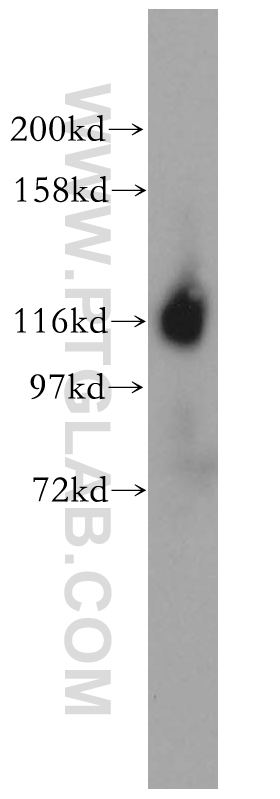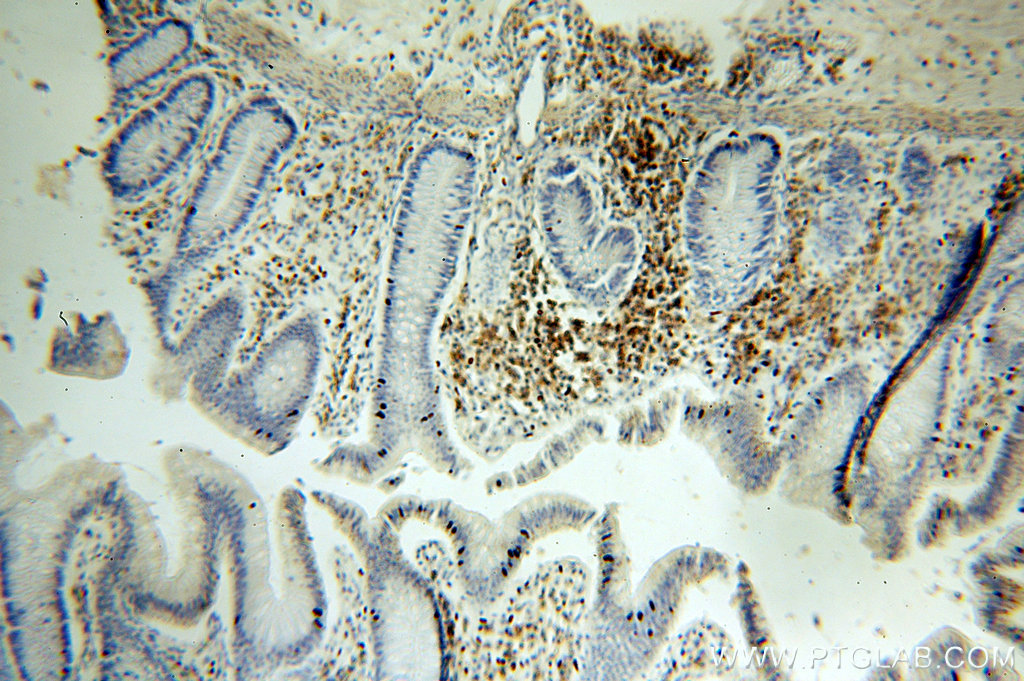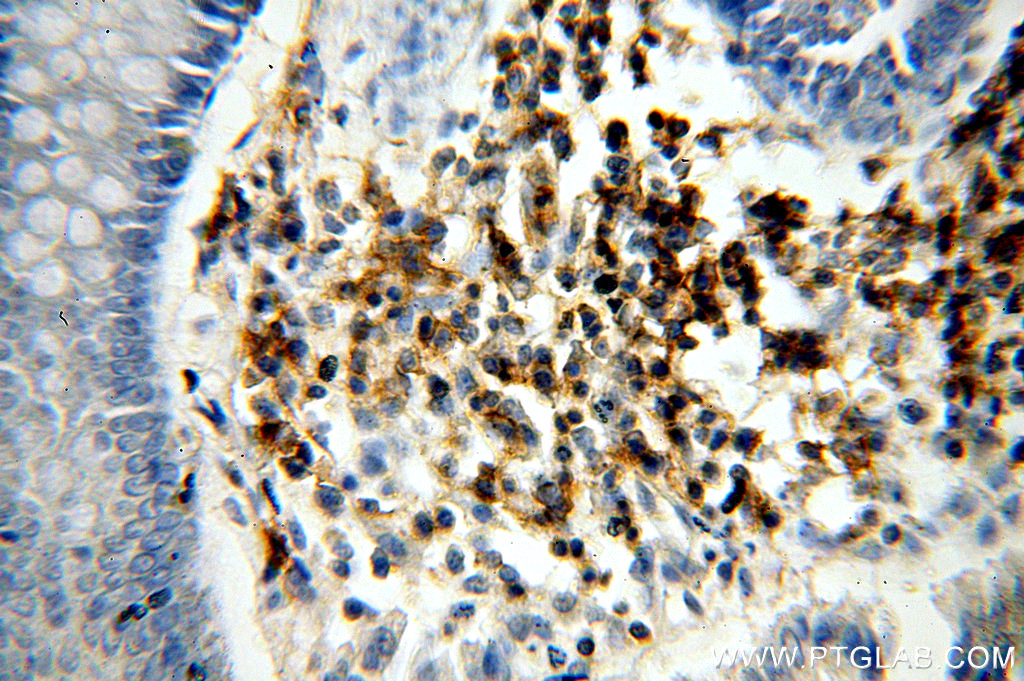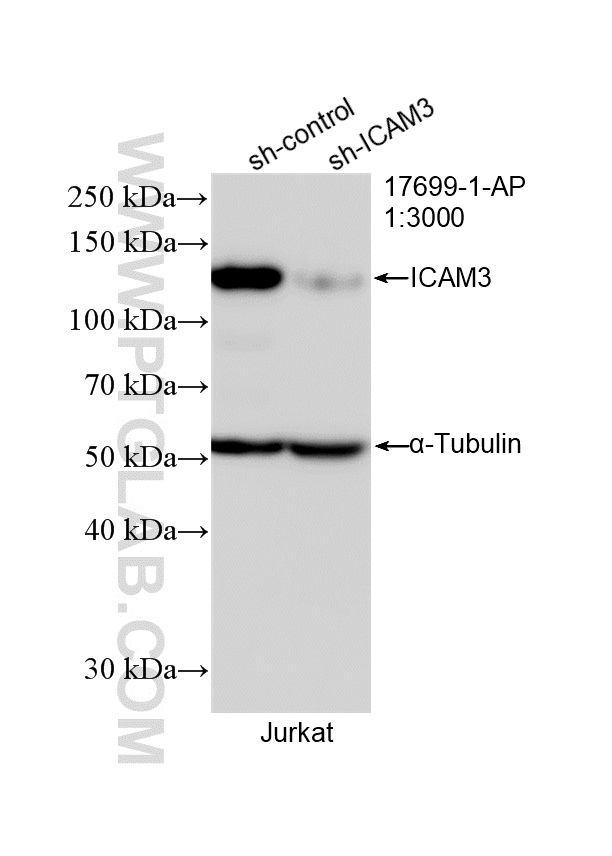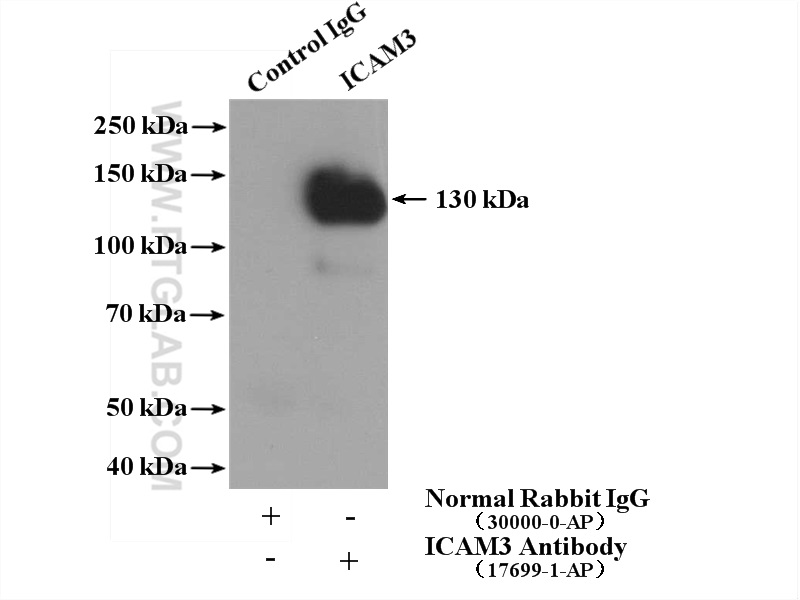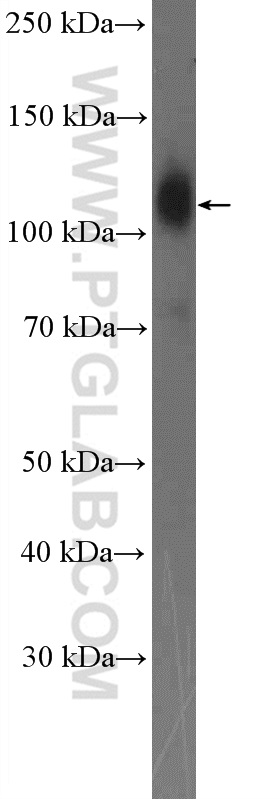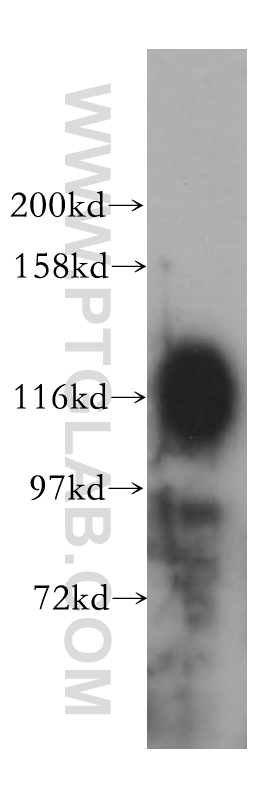验证数据展示
经过测试的应用
| Positive WB detected in | Jurkat cells, U-937 cells, Ramos cells |
| Positive IP detected in | Jurkat cells |
| Positive IHC detected in | human colon tissue Note: suggested antigen retrieval with TE buffer pH 9.0; (*) Alternatively, antigen retrieval may be performed with citrate buffer pH 6.0 |
推荐稀释比
| 应用 | 推荐稀释比 |
|---|---|
| Western Blot (WB) | WB : 1:500-1:2400 |
| Immunoprecipitation (IP) | IP : 0.5-4.0 ug for 1.0-3.0 mg of total protein lysate |
| Immunohistochemistry (IHC) | IHC : 1:20-1:200 |
| It is recommended that this reagent should be titrated in each testing system to obtain optimal results. | |
| Sample-dependent, Check data in validation data gallery. | |
产品信息
17699-1-AP targets ICAM3/CD50 in WB, IHC, IP, ELISA applications and shows reactivity with human samples.
| 经测试应用 | WB, IHC, IP, ELISA Application Description |
| 经测试反应性 | human |
| 免疫原 |
CatNo: Ag11955 Product name: Recombinant human ICAM3 protein Source: e coli.-derived, T-HIS Tag: 6*His Domain: 200-547 aa of BC058903 Sequence: GLGLFVNTSAPRQLRTFVLPVTPPRLVAPRFLEVETSWPVDCTLDGLFPASEAQVYLALGDQMLNATVMNHGDTLTATATATARADQEGAREIVCNVTLGGERREARENLTVFSFLGPIVNLSEPTAHEGSTVTVSCMAGARVQVTLDGVPAAAPGQPAQLQLNATESDDGRSFFCSATLEVDGEFLHRNSSVQLRVLYGPKIDRATCPQHLKWKDKTRHVLQCQARGNPYPELRCLKEGSSREVPVGIPFFVNVTHNGTYQCQASSSRGKYTLVVVMDIEAGSSHFVPVFVAVLLTLGVVTIVLALMYVFREHQRSGSYHVREESTYLPLTSMQPTEAMGEEPSRAE 种属同源性预测 |
| 宿主/亚型 | Rabbit / IgG |
| 抗体类别 | Polyclonal |
| 产品类型 | Antibody |
| 全称 | intercellular adhesion molecule 3 |
| 别名 | CDW50, ICAM3, CD50, ICAM 3, ICAM R |
| 计算分子量 | 547 aa, 60 kDa |
| 观测分子量 | 110-160 kDa, 60 kDa |
| GenBank蛋白编号 | BC058903 |
| 基因名称 | ICAM3/CD50 |
| Gene ID (NCBI) | 3385 |
| RRID | AB_2248763 |
| 偶联类型 | Unconjugated |
| 形式 | Liquid |
| 纯化方式 | Antigen affinity purification |
| UNIPROT ID | P32942 |
| 储存缓冲液 | PBS with 0.02% sodium azide and 50% glycerol, pH 7.3. |
| 储存条件 | Store at -20°C. Stable for one year after shipment. Aliquoting is unnecessary for -20oC storage. |
背景介绍
ICAM3 (Intercellular adhesion molecule 3) is also named as CD50, CDw50 and ICAM-R. ICAM3 is a member of the intercellular adhesion molecule (ICAM) family. ICAM3, being expressed constitutively on T cells and other leukocytes, is a potent signalling molecule and a major ligand in the initiation of T cell-mediated immune responses (PMID: 1448173, PMID: 11812993). ICAM3 is the natural ligand for both DC-SIGN and L-SIGN (PMID: 17570115). ICAM3 is abundantly and constitutively expressed in all leukocytes and is probably the most important ligand for LFA-1 in initiating immune responses, and ICAM3 is a typical type I transmembrane glycoprotein (PMID: 39991572). The promoter region of ICAM3 can be bound by co-transcription factors such as ETs and C/EBP, promoting macrophage maturation as well as monocyte extravasation (PMID: 22479382). ICAM3 is widely expressed not only in lymphocytes such as T and B cells but also in many endothelial cells and dendritic cells (PMID: 39991572).
实验方案
| Product Specific Protocols | |
|---|---|
| IHC protocol for ICAM3/CD50 antibody 17699-1-AP | Download protocol |
| IP protocol for ICAM3/CD50 antibody 17699-1-AP | Download protocol |
| WB protocol for ICAM3/CD50 antibody 17699-1-AP | Download protocol |
| Standard Protocols | |
|---|---|
| Click here to view our Standard Protocols |

